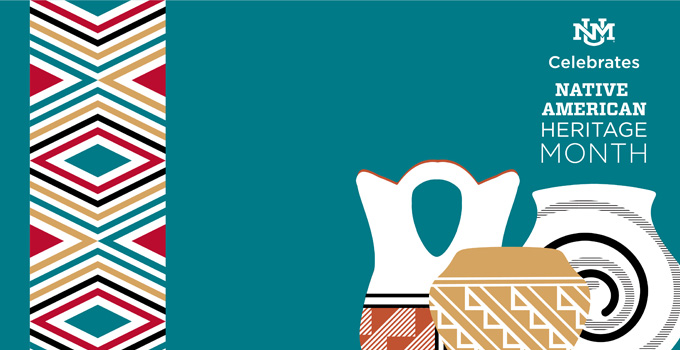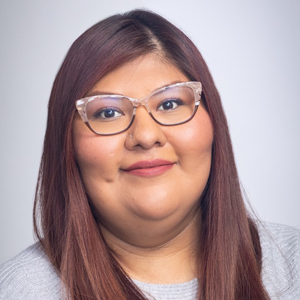“Sky Campus” in UNM Hospital’s Critical Care Tower Will Promote Employee Well-Being

Native American Heritage Month: Honoring History, Culture, Beliefs and Tradition
On Tribal lands across New Mexico, multi-generations of Native American families live in homes either together or in close proximity, in part, to remain connected to their culture, to speak their language and to support each other. For many, living on Pueblos is about being where their heart belongs. But it also can mean being far away from medical care.
Tahnee Pecos is the manager of Native American Health Services at The University of New Mexico Hospital. She’s also from the Pueblo of Jemez.
“Growing up, my dad lived with my grandparents, so my bedroom was the living room,” Pecos said.
It’s a childhood she knows not everyone can relate to, but one that she says is about maintaining a deep connection to her roots.
“There's so much value in living with your grandparents because you get taught the culture, you get taught the language, you get taught our annual traditions and beliefs and values,” she said.
For the past 15 years Pecos has helped Native American patients honor those values at UNM Hospital, helping them navigate the health care system, offering inpatient and outpatient services, as well as cultural and spiritual support for their traditional beliefs.
UNM Hospital has a unique relationship with Native Americans in New Mexico. In 1952, Bernalillo County and the Bureau of Indian Affairs entered into an agreement to create a hospital dedicated to serving Native Americans in the county and surrounding region. The hospital became part of UNM in 1969. From inception, the hospital has maintained its commitment to provide the highest level of care to the state’s Native American population.
In addition to supporting patients, Pecos and the team at UNM Hospital work with health care professionals to help them understand the culture that makes Native Americans a unique patient population and also the unique challenges they face.
“What people may not know is how far or how extensive just getting to a hospital can be,” Pecos said. “We regularly see patients and families coming to the hospital from far distances that take hours to get to and from their appointments. Some Native American patients have to plan their day of travel knowing how far they must go to receive their medical care and do have to take in account of being well prepared for things like the cost of gas and food.”
Pecos knows living on rural tribal lands is a choice, but she wants to help others understand where that choice comes from.
“If you are from a tribal community and you live there and have grown up there your whole life, it is hard to come to an urban environment,” Pecos said. “It's really hard to say to them, ‘come here because you're closer to the grocery store and closer to the health care system.’ You’re telling somebody to take themselves away from their heart or from where they belong, and to come to an unknown place where they don't have their family.”
With that important cultural influence in mind, a key component of UNM Hospital’s commitment to Native American patients involves improving access to health care. Fabián Armijo, MHA, is Executive Director of Diversity, Equity and Inclusion (DEI) at UNM Hospital.
“There’s so much that goes on behind the scenes when it comes to access,” he said. “We’re working with Native Americans directly to hear what they need in each community, what their struggles are, what their top priorities are.”

There's so much value in living with your grandparents because you get taught the culture, you get taught the language, you get taught our annual traditions and beliefs and values.
Pecos said those conversations continue with tribal communities year-round and there’s a department at UNM Hospital dedicated to getting patients the care they need.
“There are staff every day looking thoroughly through referrals, making sure patients are getting to the appropriate places and that we are avoiding having patients fall through the cracks,” she said.
In addition, Pecos said Native Americans from her team will even escort patients to appointments if requested to help them feel more at ease.
“They can feel comfortable and confident in knowing that they are supported that there is a system here at UNM that does support Native Americans,” she said.
“Native Americans can hold their heads high when they're in our hospital,” Armijo added. “I want them to know we’re going to give them good care, but also that we recognize their sacrifice so that we could build this institution that serves so many people. We're going to continue to work to make sure that people know that history. It's a very important history to all of us to know where our story started.”
Celebrating Native American Heritage Month
Part of celebrating that history happens in November for Native American Heritage Month.
UNM Hospital’s DEI, Native American Health Services and Native American Affairs at UNM Sandoval Regional Medical Center are partnering to host events all month dedicated to celebrating the Native American culture of patients, staff and the community:
Events this Month!
- Second Annual UNM Hospital Native American Market [PDF]
Sponsored by UNM Hospital Native American Health Services
Nov. 3: 10 a.m. – 4 p.m.
UNM Hospital BBRP Plaza - Cloud Eagle Seasonal Dance Group [PDF]
Nov. 10: 12 p.m. – 1 p.m.
UNM Sandoval Regional Medical Center Patio
About the Dancers: The Seasonal Dance Group was formed in 1990 to promote our cultures and languages of the Jemez and Zuni Pueblo and is comprised of members from both tribes. Aside from participating in Tribal obligations throughout the year, the Seasonal Dance Group also sing and dance at many functions through the United States. Dances include: The Buffalo Dance, Corn Dance, Rainbow Dance and the Eagle Dance. - Rock Your Mocs [PDF]
Nov. 15: 12 p.m. – 1 p.m.
UNM Hospital BBRP Plaza
About Rock Your Mocs: the global event was started in New Mexico and encourages Native Americans to show off their moccasins for a day. At UNM Hospital, the first 100 participants to show up to the plaza will receive an oven bread, cookie or pie.
- Zuni Olla Maidens Dance Group [PDF]
Nov. 17: 12 p.m. – 1 p.m.
UNM Hospital BBRP Plaza
About the Dancers: The Zuni Olla Maidens are a women’s dance group composed of family members. The women dance the pottery dance to the accompaniment of a drum and a women’s rattle. They provide a narrative about the meaning of their songs, the symbolism of their pottery, and the significance of their dance regalia. They also share stories about their experiences traveling to different parts of the United States and Canada - Ryedale Largo & Dine Navajo/Mescalero Apache Dance Group [PDF]
Nov. 30: 12 p.m. – 1 p.m.
UNM Hospital BBRP Plaza
About the Dancers: Originating from Pinedale, NM, Mr. Largo has dedicated over 16 years to his craft. Now, with this 4th – generation dance group, renowned for their captivating performances that showcase the traditional dances of their Navajo and Mescalero Apache Tribes.